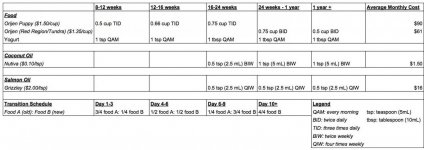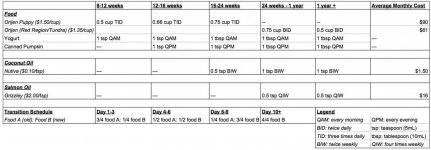FrankTheTank
New member
- Joined
- Mar 6, 2017
- Messages
- 18
- Reaction score
- 0
Hi all. New member here. I've spent the last few days diving into these forums in search of the best food for our lifestyle, what kind of supplements to use, when to use them, and how much. I ended up with so much information that I made a chart (see attached).
Here is what I've come up with. Please give me feedback on any of this that you think there may be a better approach.
I landed on Orijen based on content, 5 star rating on dogfoodadvisor.com, and recommendations from you all. Keep in mind this is just a starting point and its very possible Frank just wont like it. We're going to start on Orijen puppy and transition to adult at 6 months. His breeder is starting him on Kirkland Nature's Domain so we will transition him to Orijen around 12 weeks (he comes home with us at 10 weeks). The amounts that I came up with are a general compilation based on everything that I've read on these forums (plus the package directions on Orijen). Also stole some notes from [MENTION=2]2bullymama[/MENTION]
I decided not to start coconut oil and salmon oil for a few weeks as he will be adjusting to the new food.
My last question that I didn't seem to find in the forums: do you guys use vitamins/supplements? With my background in medicine/pharmacy, I can tell you that a multivitamin in the setting of humans really isn't necessary unless you're an olympian. Same hold for dogs? Our breeder starts the puppies/mom on Dog Bloom which seems to be a vitamin/mineral complex. Thoughts? Thoughts on anything else? Places you can find these items cheaper? I primarily based prices off of Amazon and calculated per cup cost with an approximation of 4 cups per pound of food.
Thanks! G, S & F

Here is what I've come up with. Please give me feedback on any of this that you think there may be a better approach.
I landed on Orijen based on content, 5 star rating on dogfoodadvisor.com, and recommendations from you all. Keep in mind this is just a starting point and its very possible Frank just wont like it. We're going to start on Orijen puppy and transition to adult at 6 months. His breeder is starting him on Kirkland Nature's Domain so we will transition him to Orijen around 12 weeks (he comes home with us at 10 weeks). The amounts that I came up with are a general compilation based on everything that I've read on these forums (plus the package directions on Orijen). Also stole some notes from [MENTION=2]2bullymama[/MENTION]
I decided not to start coconut oil and salmon oil for a few weeks as he will be adjusting to the new food.
My last question that I didn't seem to find in the forums: do you guys use vitamins/supplements? With my background in medicine/pharmacy, I can tell you that a multivitamin in the setting of humans really isn't necessary unless you're an olympian. Same hold for dogs? Our breeder starts the puppies/mom on Dog Bloom which seems to be a vitamin/mineral complex. Thoughts? Thoughts on anything else? Places you can find these items cheaper? I primarily based prices off of Amazon and calculated per cup cost with an approximation of 4 cups per pound of food.
Thanks! G, S & F













